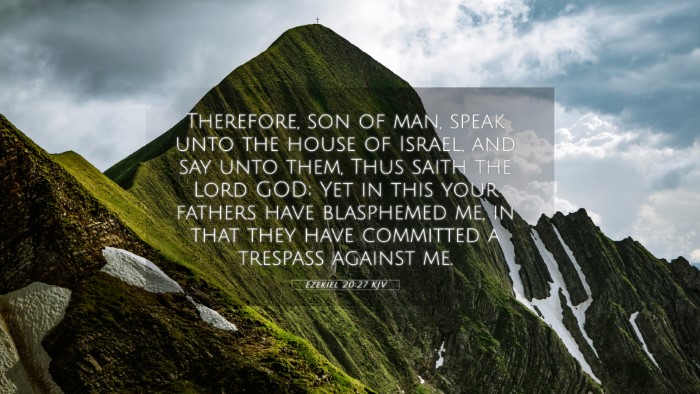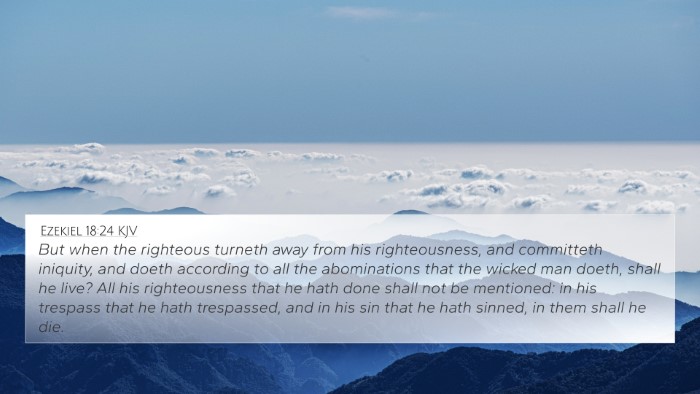Ezekiel 20:27 - Overview and Meaning
Ezekiel 20:27 states: "Therefore, son of man, speak to the house of Israel, and say to them: 'Thus says the Lord God: "Yet in this your fathers have blasphemed Me, by being unfaithful to Me."'
The verse highlights a critical moment where God, through the prophet Ezekiel, addresses the unfaithfulness of the Israelites. The background context reveals that the people had repeatedly turned away from God, causing Him to express anger over their actions.
Insights from Public Domain Commentaries
- Matthew Henry's Commentary:
Henry notes that this passage emphasizes God's consistent call to repentance amidst rebellion. He points out that God's acknowledgment of their father's sins serves as a mirror reflecting the ongoing disobedience of the current generation. It underscores the nature of intergenerational sin and refusal to honor God.
- Albert Barnes' Notes:
Barnes explains that the statement of blasphemy reveals the seriousness with which God views the Israelites' actions. The term 'blaspheme' indicates not only a failure in worship but a direct insult to God's sovereignty. The people are reminded of their obligation to recognize and respect God's authority.
- Adam Clarke's Commentary:
Clarke remarks on the need for sober reflection by the people of Israel. He calls attention to the weight of their transgressions, emphasizing that every act of disloyalty is a declaration of independence from God. Clarke notes the importance of returning to faithfulness to restore the covenant relationship.
Thematic Connections and Cross-References
This verse can be connected to numerous other scriptures that elaborate on themes of rebellion, God's faithfulness, and the call to repentance. Below are important cross-references to consider:
- Deuteronomy 9:24: "You have been rebellious against the Lord from the day that I knew you." - This verse emphasizes the historical context of Israel's continued rebellion against God.
- Psalms 78:56-57: "Yet they tempted and provoked the most high God, and kept not his testimonies." - Reflects on the unfaithfulness of Israel in their history.
- Isaiah 1:2-4: "Hear, O heavens, and give ear, O earth! For the Lord has spoken: 'I have nourished and brought up children, and they have rebelled against Me.'" - This clearly expresses the theme of rebellion.
- Hebrews 3:12: "Take heed, brethren, lest there be in any of you an evil heart of unbelief in departing from the living God." - An exhortation applicable to the context of Ezekiel's warning.
- Romans 2:24: "For the name of God is blasphemed among the Gentiles because of you." - Highlights the consequences of unfaithfulness extending beyond Israel.
- Jeremiah 3:25: "We lie down in our shame, and our confusion covers us; For we have sinned against the Lord our God." - Acknowledgement of sin and its effects.
- Revelation 2:5: "Remember therefore from where you have fallen; repent, and do the works you did at first." - Calls for a return to genuine faithfulness.
Connecting Themes and Lessons
The themes inherent in Ezekiel 20:27 resonate throughout scripture, helping us understand God's relentless pursuit of a faithful relationship with His people. The unfaithfulness of Israel is not an isolated event; rather, it serves as a cautionary tale for all believers today, encouraging us to consider the implications of our actions and the necessity of repentance.
Conclusion
In summary, Ezekiel 20:27 serves as a profound reminder of human frailty and God’s unwavering call to faithfulness. It emphasizes the significance of stewardship over our spiritual lives and the consequences of neglecting our relationship with God. The verse not only connects with numerous others throughout the Bible underscoring similar themes but also invites us into deeper reflections on our own faith journeys.
Engaging with this verse and its connections through various Bible cross-referencing tools can illuminate our understanding. By identifying these connections, we enrich our study of scripture and reinforce our commitment to living faithfully in accordance with God's will.









